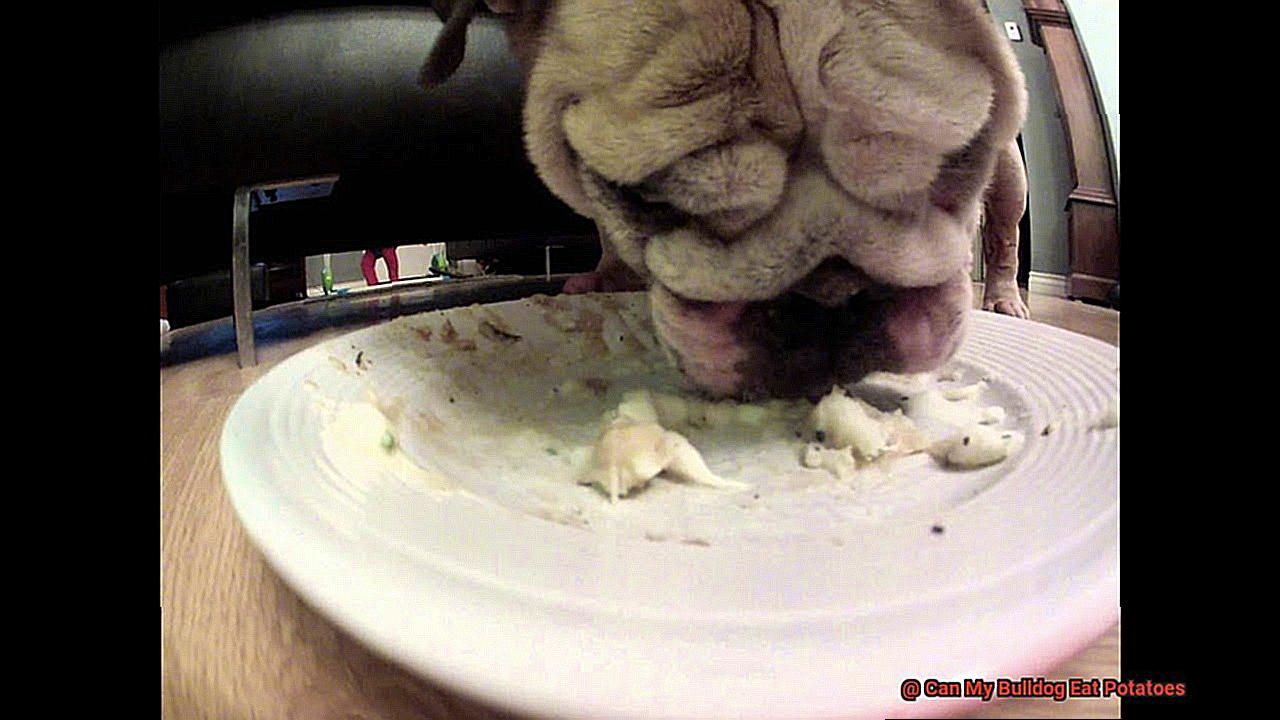Can My Bulldog Eat Potatoes?
Imagine this scene: your loyal bulldog lounging at your feet, eyes fixated on your plate of perfectly crisp, golden fries. It’s tempting to toss a few their way, but should you? Are potatoes a harmless indulgence or a potential health hazard for our four-legged friends? As responsible dog owners, we owe it to our fur babies to be well-versed in the foods we offer them.
In this blog post, we’ll dive into the world of bulldog nutrition and explore the ins and outs of feeding potatoes to these lovable companions. From nutritional benefits to possible concerns, we’ll provide you with all the information you need to make informed choices for your beloved pet.
So grab a cuppa and let’s dig deep into the potato dilemma that surrounds bulldogs.
Considerations for Feeding Potatoes to Bulldogs
Contents
- 1 Considerations for Feeding Potatoes to Bulldogs
- 2 What Are the Nutritional Benefits of Sweet Potatoes for Bulldogs?
- 3 How Much Potato Should I Feed My Bulldog?
- 4 Potential Allergies and Sensitivities to Potatoes in Bulldogs
- 5 Cooking and Preparing Potatoes for Your Bulldog
- 6 The Pros and Cons of Feeding Potatoes to Bulldogs
- 6.1 Pros of Feeding Potatoes to Bulldogs:
- 6.2 Cons of Feeding Potatoes to Bulldogs:
- 6.3 Safe Preparation Tips: Simplicity is Key: When preparing potatoes for your bulldog, opt for boiled or baked methods without additional ingredients. Avoid adding butter, oil, salt, or seasonings that can be harmful to your bulldog’s health. Vet’s Verdict: Always consult with your veterinarian before introducing any new food into your bulldog’s diet. They can provide personalized advice based on your bulldog’s specific needs and health condition. Health Conditions: If your bulldog has pre-existing health issues like diabetes or kidney problems, it is best to avoid feeding them potatoes altogether. Your vet can guide you in finding suitable alternatives. In the grand potato debate, the answer lies in moderation and individual considerations. While potatoes can offer nutritional benefits to Bulldogs, it is crucial to be mindful of potential allergies, weight management, and any underlying health conditions. As responsible pet parents, consult with your veterinarian and monitor your bulldog’s reaction to potatoes for a happy and healthy furry companion. Alternatives to Feeding Potatoes to Bulldogs When it comes to feeding our beloved bulldogs, a balanced diet is crucial to support their overall well-being. While potatoes are not toxic for bulldogs, they can pose challenges such as weight gain and potential allergies. But fret not, there are plenty of tasty alternatives that can provide essential nutrients without the drawbacks. Read on to discover alternative options that will have your Frenchie drooling with delight. Sweet Potatoes: A Pawsome Substitute
- 6.4 Starchy Vegetables: Pumpkins and Squashes
- 6.5 Lean Protein Sources: Chicken and Turkey
- 6.6 Fruit-Tastic Treats: Apples and Blueberries
- 7 Tips for Monitoring Your Bulldog’s Health When Eating Potatoes
- 8 Conclusion
Many dog owners wonder if it is safe to feed their bulldogs potatoes. The answer is yes, Bulldogs can eat potatoes, but there are a few important considerations to keep in mind. Potatoes can be a tasty addition to your bulldog’s diet, but it is crucial to understand how to prepare and portion them correctly.
Cooking is key
Raw potatoes should never be fed to dogs as they contain solanine, a toxic substance that can cause digestive upset. To make potatoes safe for your bulldog to eat, it is essential to cook them thoroughly. Boiling or baking potatoes without any added fats or seasonings is the safest option. This cooking method removes the solanine and makes the potatoes easier for your dog to digest.
Watch out for additives
When preparing potatoes for your bulldog, remember to remove any seasonings or additives. Ingredients like salt, butter, or spices can be harmful to dogs and may cause stomach upset. Stick to plain, cooked potatoes when feeding them to your furry friend.
Portion control is key
Bulldogs are prone to obesity, so it is crucial to monitor their potato intake and ensure they are getting a balanced diet. Potatoes are high in carbohydrates and can contribute to weight gain if not portioned correctly. Remember that potatoes should only be a small part of your bulldog’s overall meal plan.
Consider sweet potatoes

If you are looking for a healthier alternative to regular potatoes, consider feeding your bulldog sweet potatoes instead. Sweet potatoes are lower in calories and packed with vitamins and minerals that can provide additional nutritional benefits for your furry friend.
Monitor for allergies or sensitivities
Every dog is different, and some bulldogs may have allergies or sensitivities to potatoes. When introducing potatoes into your bulldog’s diet, start with small amounts and observe how they react. If you notice any signs of digestive upset or allergic reactions, such as diarrhea, vomiting, or itching, discontinue feeding potatoes and consult with your veterinarian.
What Are the Nutritional Benefits of Sweet Potatoes for Bulldogs?
Look no further than the humble sweet potato. These tasty tubers are not only a crowd favorite among humans but also offer a myriad of health benefits for our beloved bulldogs. In this blog post, we’ll explore the nutritional advantages of sweet potatoes and why they should be a staple in your bulldog’s diet.
A Bulldog’s Nutritional Superfood:
- Vitamins Galore: Sweet potatoes are packed with essential vitamins that promote overall well-being in your bulldog. They are an excellent source of vitamin A, which supports healthy vision, immune function, and skin health. Vitamin C helps boost the immune system, while vitamin B6 aids in brain development and nervous system function.
- Digestive Health: Bulldogs are known for their sensitive tummies, but fear not. Sweet potatoes are high in fiber, promoting healthy digestion and preventing constipation. Their soluble fiber content also acts as a prebiotic, supporting the growth of beneficial gut bacteria.
- Antioxidant Boost: Just like humans, bulldogs can benefit from antioxidants that fight free radicals and reduce inflammation. Sweet potatoes contain antioxidants such as beta-carotene, which converts to vitamin A in your bulldog’s body and supports a healthy immune system.
- Heart Health: Bulldogs, like other brachycephalic breeds, may be prone to heart issues. The potassium content in sweet potatoes helps maintain proper heart function and regulate blood pressure.
- Weight Management: If your bulldog needs to shed a few pounds, sweet potatoes are an ideal choice due to their low fat and calorie content. Their complex carbohydrates provide sustained energy without the risk of excessive weight gain.
- Skin and Coat Care: Bulldogs often struggle with skin issues. The high beta-carotene content in sweet potatoes promotes healthy skin and a shiny coat, reducing itchiness and dryness.
- Natural and Safe: Say goodbye to processed sugars found in commercial dog treats. Sweet potatoes offer a natural source of sweetness that your bulldog will love without the harmful additives.
How Much Potato Should I Feed My Bulldog?
As you explore different food options, you might wonder how much potato to feed your bulldog. In this article, we’ll dive into the world of potatoes and provide you with expert guidance on portion sizes and factors to consider when feeding this starchy delight to your beloved bulldog.
Portion Sizes:

When it comes to feeding potatoes to your bulldog, moderation is key. Bulldogs are prone to weight gain, so it’s important to be mindful of portion sizes. Aim for small portions of cooked potatoes as part of a balanced meal. A general guideline is to provide around 10% of your bulldog’s daily calorie intake from carbohydrates, including potatoes.
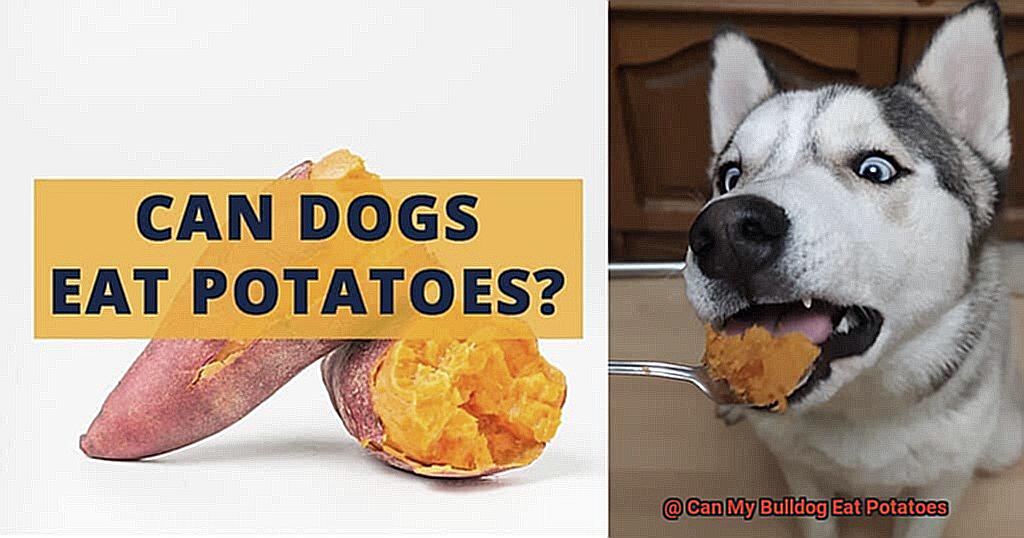
Factors to Consider:
- Cooked, Not Raw: Raw potatoes can be challenging for dogs to digest and may cause gastrointestinal issues. Always cook the potatoes before feeding them to your bulldog.
- Say No to Seasonings: While you may be tempted to add some flavor to your bulldog’s potatoes, it’s best to avoid seasonings like salt, butter, or spices. These additives can be harmful to your dog’s health.
- Consult Your Veterinarian: Every bulldog is unique, so it’s essential to consult with your veterinarian about the appropriate portion size for your dog based on their age, weight, and activity level. Your vet will provide personalized advice tailored specifically for your bulldog.
- Allergies and Sensitivities: Some bulldogs may have allergies or sensitivities to potatoes. Monitor your dog’s reaction when introducing this food into their diet. If you notice any signs of digestive upset or allergic reactions, discontinue feeding them potatoes and consult with your veterinarian.
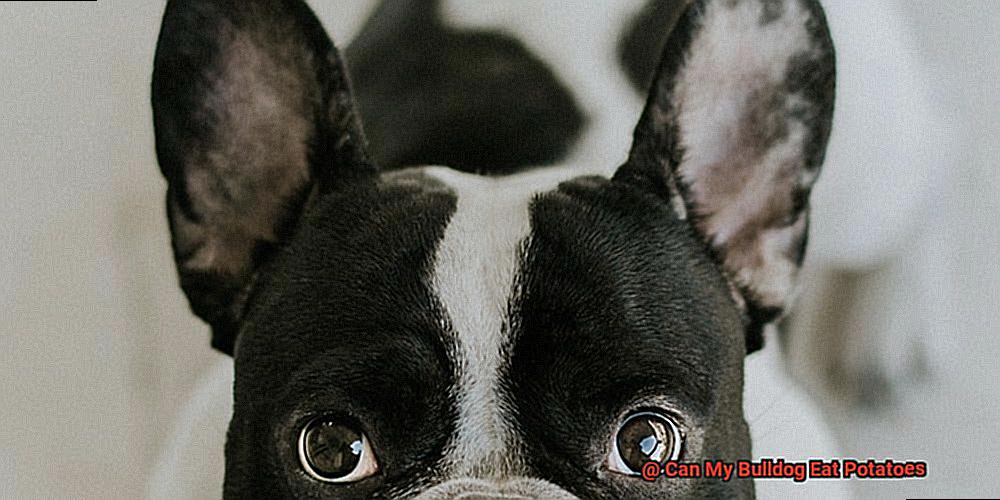
Potential Allergies and Sensitivities to Potatoes in Bulldogs
French Bulldogs are beloved companions, known for their playful nature and distinctive appearance. However, like any other breed, French Bulldogs may have allergies or sensitivities to certain foods, including potatoes. In this article, we will explore the potential allergies and sensitivities to potatoes in Bulldogs, focusing specifically on our adorable French Bulldog friends. Let’s dive in.
Understanding Allergies and Sensitivities:
Allergies occur when the immune system overreacts to a specific substance, while sensitivities may cause milder symptoms. Bulldogs can be prone to both allergies and sensitivities, making it essential for owners to be aware of potential triggers.
Potato Proteins and Allergic Reactions:
Potatoes contain proteins called glycoalkaloids, which can trigger allergic reactions in some individuals, including bulldogs. The most common allergenic proteins in potatoes are patatin and protease inhibitors. These proteins can cause a range of symptoms in Bulldogs with potato allergies.
Symptoms of Potato Allergies and Sensitivities:
If your French Bulldog is allergic or sensitive to potatoes, you may notice symptoms such as:
- Itching and redness of the skin
- Ear infections
- Excessive scratching or licking
- Gastrointestinal upset (vomiting, diarrhea)
- Respiratory issues (coughing, wheezing)
Monitoring and Diagnosis:
It is crucial for French Bulldog owners to closely monitor their dog’s reaction to potatoes. If any concerning symptoms arise, consulting with a veterinarian is recommended. Food elimination trials can help determine if your Frenchie has an allergy or sensitivity to potatoes by removing them from the diet for a period of time and observing any improvements in symptoms.
Alternative Carbohydrate Sources:
If your French Bulldog has a potato allergy or sensitivity, alternative carbohydrate sources can be considered. Sweet potatoes are a popular substitute, as they are generally well-tolerated by dogs. Additionally, grain-free options may be suitable for Bulldogs with potato allergies or sensitivities.
Reading Ingredient Labels:
When managing potato allergies or sensitivities in French Bulldogs, it is crucial to read ingredient labels carefully. Potatoes can be found in various forms in commercial dog foods, treats, and even supplements. Look for alternative carbohydrate sources and avoid products that contain potatoes or potato-derived ingredients.
Consulting with Professionals:
Seeking guidance from a veterinarian or a veterinary nutritionist can provide further assistance in managing potato allergies or sensitivities in French Bulldogs. They can help you develop a suitable diet plan and recommend appropriate alternatives.
Cooking and Preparing Potatoes for Your Bulldog
Potatoes are a staple in many households, and you may be wondering if they can be safely consumed by your beloved French Bulldog. As an expert in bulldog nutrition, I’m here to guide you through the process of cooking and preparing potatoes for your furry friend in a safe and nutritious way.
First and foremost, it’s crucial to note that raw potatoes should never be fed to dogs, including bulldogs. Raw potatoes contain solanine, a toxic substance that can cause gastrointestinal upset, vomiting, and even more severe symptoms in dogs. Therefore, always cook potatoes thoroughly before offering them to your bulldog.
The best cooking methods for potatoes when it comes to your bulldog’s health are boiling and baking. Boiling potatoes until they are soft and mashable is a safe and easy method. Make sure to remove the skin before mashing or cutting them into small, easily digestible pieces.
Baking potatoes is another excellent option. Bake them at a moderate temperature until they are tender, ensuring that most of the nutrients are retained. Remember to remove any seasoning or additional ingredients that may be harmful to your dog, such as garlic or onion powder.
When preparing potatoes for your bulldog, it’s essential to avoid adding any butter, oils, salt, or other seasonings. These additions can be detrimental to their health and may lead to weight gain or other digestive issues. Keeping the preparation simple and plain is the best approach when it comes to feeding potatoes to your furry companion.
Once the potatoes are cooked and prepared, you can offer them as a treat or mix them with your bulldog’s regular food. However, it’s important to remember that potatoes should only be given in moderation. While they contain beneficial nutrients like vitamin C and potassium, excessive consumption can lead to weight gain and potential health issues.
It’s worth mentioning that sweet potatoes are generally considered safer and more nutritious for dogs compared to regular white potatoes. Sweet potatoes are packed with vitamins A and C, as well as dietary fiber, making them a healthier alternative. However, the same cooking and preparation methods should be followed to ensure your bulldog’s safety and well-being.
Incorporating these guidelines into your bulldog’s diet can help you provide a safe and nutritious potato treat. However, it’s always recommended to consult with your veterinarian before introducing any new food into your bulldog’s diet. They can provide personalized advice based on your dog’s specific needs and health conditions.
The Pros and Cons of Feeding Potatoes to Bulldogs
In this article, we’ll dive into the pros and cons of feeding potatoes to Bulldogs, shedding light on the nutritional benefits and potential risks associated with this starchy vegetable.
Pros of Feeding Potatoes to Bulldogs:
Carbohydrate Energy Boost:
Potatoes are an excellent source of carbohydrates, which provide energy for our energetic bulldogs. This can be especially beneficial for active bulldogs who require extra fuel for their adventures.
Nutritional Powerhouse:
Potatoes are packed with essential nutrients such as vitamin C, vitamin B6, potassium, and fiber. These nutrients play a vital role in promoting overall well-being, supporting immune function, and aiding digestion.
Cons of Feeding Potatoes to Bulldogs:
Allergen Alert:
Bulldogs are known to have allergies and sensitivities, and potatoes can be a common allergen. Keep a watchful eye on your furry friend after introducing potatoes into their diet, looking out for any signs of adverse reactions such as itching, digestive issues, or skin irritations.
Weight Management Woes:
Bulldogs are prone to weight gain, and potatoes can contribute to this issue if not portioned properly. The high starch content in potatoes can lead to excess calorie intake if overfed. Moderation is key.
Safe Preparation Tips:
Simplicity is Key:
When preparing potatoes for your bulldog, opt for boiled or baked methods without additional ingredients. Avoid adding butter, oil, salt, or seasonings that can be harmful to your bulldog’s health.
Vet’s Verdict:
Always consult with your veterinarian before introducing any new food into your bulldog’s diet. They can provide personalized advice based on your bulldog’s specific needs and health condition.
Health Conditions:
If your bulldog has pre-existing health issues like diabetes or kidney problems, it is best to avoid feeding them potatoes altogether. Your vet can guide you in finding suitable alternatives.
In the grand potato debate, the answer lies in moderation and individual considerations. While potatoes can offer nutritional benefits to Bulldogs, it is crucial to be mindful of potential allergies, weight management, and any underlying health conditions. As responsible pet parents, consult with your veterinarian and monitor your bulldog’s reaction to potatoes for a happy and healthy furry companion.
Alternatives to Feeding Potatoes to Bulldogs
When it comes to feeding our beloved bulldogs, a balanced diet is crucial to support their overall well-being. While potatoes are not toxic for bulldogs, they can pose challenges such as weight gain and potential allergies. But fret not, there are plenty of tasty alternatives that can provide essential nutrients without the drawbacks. Read on to discover alternative options that will have your Frenchie drooling with delight.
Sweet Potatoes: A Pawsome Substitute
Sweet potatoes are a pawpular choice among bulldog owners as they offer a healthier alternative to regular potatoes. These orange wonders are lower in carbohydrates and higher in fiber, making them a nutritious choice for your pup. Whether cooked and mashed or sliced and baked, sweet potatoes are sure to satisfy your Frenchie’s taste buds while providing essential nutrients.
Starchy Vegetables: Pumpkins and Squashes
Pumpkins and butternut squashes are another barktastic option for your furry friend. These veggies are rich in vitamins and minerals while being lower in carbohydrates compared to potatoes. You can easily incorporate them into your Frenchie’s diet by steaming or baking them and adding them as a tasty side dish.
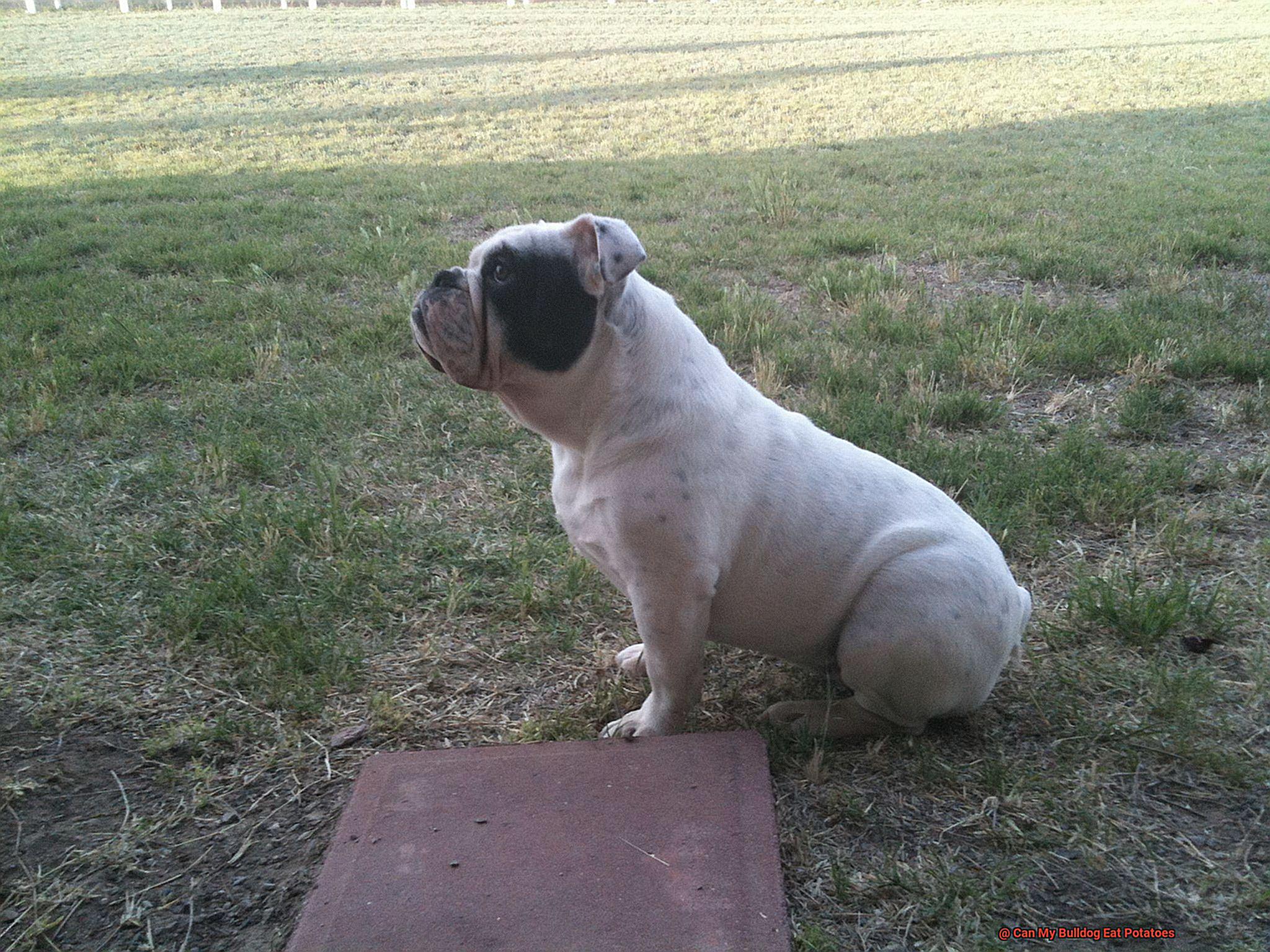
Lean Protein Sources: Chicken and Turkey
To keep your bulldog’s muscles strong and healthy, lean protein is key. Consider replacing potatoes with lean protein sources like chicken or turkey in their meals. These meats are highly digestible and provide essential amino acids that support muscle development and overall health.
Fruit-Tastic Treats: Apples and Blueberries
Who said treats can’t be healthy? Apples and blueberries make paw-some snacks for your bulldog. Low in calories and packed with vitamins and antioxidants, these fruits support your Frenchie’s immune system. Just make sure to remove any seeds or cores and offer them in moderation.
Remember:
- Introduce new foods gradually to avoid digestive upset.
- Consult with your veterinarian before making any significant changes to your bulldog’s diet.
- Monitor your Frenchie for any adverse reactions to ensure their health and happiness.
Tips for Monitoring Your Bulldog’s Health When Eating Potatoes
French Bulldogs are adorable and beloved companions, but they can be prone to certain health issues such as obesity, allergies, and digestive problems. If you’re considering adding potatoes to your bulldog’s diet, it’s essential to monitor their health closely. In this article, we will provide you with valuable tips on how to ensure your bulldog’s well-being when eating potatoes.
Start Small and Observe:
When introducing potatoes into your bulldog’s diet, it’s crucial to start with small portions and gradually increase the quantity over time. This allows you to closely monitor how your bulldog’s body responds to this new addition. Keep a keen eye out for any signs of allergies or sensitivities, such as itchiness, redness, or gastrointestinal disturbances.
Portion Control is Key:
Bulldogs are prone to obesity, and potatoes are high in carbohydrates. Controlling portion sizes is essential to prevent weight gain and other health issues. Treat potatoes as an occasional treat rather than a regular part of their meals.
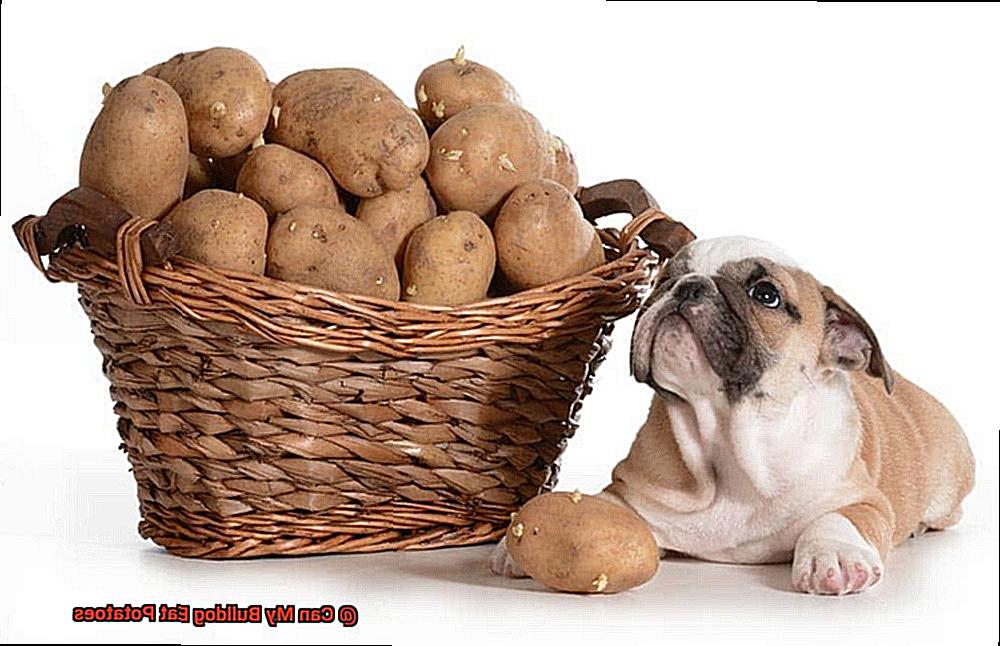
Choose the Right Preparation Method:
Properly cooking potatoes is crucial for your bulldog’s health. Avoid feeding them raw or uncooked potatoes, as they can be difficult to digest and may contain harmful substances like solanine. Opt for boiled, baked, or steamed potatoes instead.
Avoid Added Ingredients:
When feeding your bulldog potatoes, make sure they are plain and free from added ingredients like butter, oil, salt, or spices. These additives can be harmful to dogs and may cause digestive upset or other health issues.
Monitor Digestive Health:
Regularly check your bulldog’s stool consistency and frequency after they eat potatoes. Any changes such as diarrhea or constipation could indicate digestive issues caused by potatoes. If problems persist, consult with your veterinarian for further guidance.
Consult with a Veterinarian:
Every bulldog is unique, and what works for one dog may not work for another. It’s always best to consult with a veterinarian before introducing any new food into your bulldog’s diet, including potatoes. They can provide personalized advice based on your bulldog’s specific health needs and dietary requirements.
rMGOLVPwMKI” >
Conclusion
In conclusion, it is safe for your bulldog to enjoy the occasional potato treat.
However, moderation is key. Bulldogs have sensitive stomachs, so feeding them excessive amounts of potatoes can lead to digestive issues.
Remember to always cook the potatoes thoroughly and remove any seasoning or additives that could be harmful to your furry friend. Additionally, keep in mind that potatoes should only be given as a supplement to a balanced and nutritious diet.
So go ahead and share a small portion of mashed or boiled potatoes with your bulldog, but make sure it’s just an occasional indulgence rather than a regular part of their meals.
You may also like:
Simplicity is Key:
When preparing potatoes for your bulldog, opt for boiled or baked methods without additional ingredients. Avoid adding butter, oil, salt, or seasonings that can be harmful to your bulldog’s health.
Vet’s Verdict:
Always consult with your veterinarian before introducing any new food into your bulldog’s diet. They can provide personalized advice based on your bulldog’s specific needs and health condition.
Health Conditions:
If your bulldog has pre-existing health issues like diabetes or kidney problems, it is best to avoid feeding them potatoes altogether. Your vet can guide you in finding suitable alternatives.
In the grand potato debate, the answer lies in moderation and individual considerations. While potatoes can offer nutritional benefits to Bulldogs, it is crucial to be mindful of potential allergies, weight management, and any underlying health conditions. As responsible pet parents, consult with your veterinarian and monitor your bulldog’s reaction to potatoes for a happy and healthy furry companion.
Alternatives to Feeding Potatoes to Bulldogs
When it comes to feeding our beloved bulldogs, a balanced diet is crucial to support their overall well-being. While potatoes are not toxic for bulldogs, they can pose challenges such as weight gain and potential allergies. But fret not, there are plenty of tasty alternatives that can provide essential nutrients without the drawbacks. Read on to discover alternative options that will have your Frenchie drooling with delight.
Sweet Potatoes: A Pawsome Substitute
Sweet potatoes are a pawpular choice among bulldog owners as they offer a healthier alternative to regular potatoes. These orange wonders are lower in carbohydrates and higher in fiber, making them a nutritious choice for your pup. Whether cooked and mashed or sliced and baked, sweet potatoes are sure to satisfy your Frenchie’s taste buds while providing essential nutrients.
Starchy Vegetables: Pumpkins and Squashes
Pumpkins and butternut squashes are another barktastic option for your furry friend. These veggies are rich in vitamins and minerals while being lower in carbohydrates compared to potatoes. You can easily incorporate them into your Frenchie’s diet by steaming or baking them and adding them as a tasty side dish.

Lean Protein Sources: Chicken and Turkey
To keep your bulldog’s muscles strong and healthy, lean protein is key. Consider replacing potatoes with lean protein sources like chicken or turkey in their meals. These meats are highly digestible and provide essential amino acids that support muscle development and overall health.
Fruit-Tastic Treats: Apples and Blueberries
Who said treats can’t be healthy? Apples and blueberries make paw-some snacks for your bulldog. Low in calories and packed with vitamins and antioxidants, these fruits support your Frenchie’s immune system. Just make sure to remove any seeds or cores and offer them in moderation.
Remember:
- Introduce new foods gradually to avoid digestive upset.
- Consult with your veterinarian before making any significant changes to your bulldog’s diet.
- Monitor your Frenchie for any adverse reactions to ensure their health and happiness.
Tips for Monitoring Your Bulldog’s Health When Eating Potatoes
French Bulldogs are adorable and beloved companions, but they can be prone to certain health issues such as obesity, allergies, and digestive problems. If you’re considering adding potatoes to your bulldog’s diet, it’s essential to monitor their health closely. In this article, we will provide you with valuable tips on how to ensure your bulldog’s well-being when eating potatoes.
Start Small and Observe:
When introducing potatoes into your bulldog’s diet, it’s crucial to start with small portions and gradually increase the quantity over time. This allows you to closely monitor how your bulldog’s body responds to this new addition. Keep a keen eye out for any signs of allergies or sensitivities, such as itchiness, redness, or gastrointestinal disturbances.
Portion Control is Key:
Bulldogs are prone to obesity, and potatoes are high in carbohydrates. Controlling portion sizes is essential to prevent weight gain and other health issues. Treat potatoes as an occasional treat rather than a regular part of their meals.

Choose the Right Preparation Method:
Properly cooking potatoes is crucial for your bulldog’s health. Avoid feeding them raw or uncooked potatoes, as they can be difficult to digest and may contain harmful substances like solanine. Opt for boiled, baked, or steamed potatoes instead.
Avoid Added Ingredients:
When feeding your bulldog potatoes, make sure they are plain and free from added ingredients like butter, oil, salt, or spices. These additives can be harmful to dogs and may cause digestive upset or other health issues.
Monitor Digestive Health:
Regularly check your bulldog’s stool consistency and frequency after they eat potatoes. Any changes such as diarrhea or constipation could indicate digestive issues caused by potatoes. If problems persist, consult with your veterinarian for further guidance.
Consult with a Veterinarian:
Every bulldog is unique, and what works for one dog may not work for another. It’s always best to consult with a veterinarian before introducing any new food into your bulldog’s diet, including potatoes. They can provide personalized advice based on your bulldog’s specific health needs and dietary requirements.
rMGOLVPwMKI” >
Conclusion
In conclusion, it is safe for your bulldog to enjoy the occasional potato treat.
However, moderation is key. Bulldogs have sensitive stomachs, so feeding them excessive amounts of potatoes can lead to digestive issues.
Remember to always cook the potatoes thoroughly and remove any seasoning or additives that could be harmful to your furry friend. Additionally, keep in mind that potatoes should only be given as a supplement to a balanced and nutritious diet.
So go ahead and share a small portion of mashed or boiled potatoes with your bulldog, but make sure it’s just an occasional indulgence rather than a regular part of their meals.
You may also like:
When preparing potatoes for your bulldog, opt for boiled or baked methods without additional ingredients. Avoid adding butter, oil, salt, or seasonings that can be harmful to your bulldog’s health.
Vet’s Verdict:
Always consult with your veterinarian before introducing any new food into your bulldog’s diet. They can provide personalized advice based on your bulldog’s specific needs and health condition.
Health Conditions:
If your bulldog has pre-existing health issues like diabetes or kidney problems, it is best to avoid feeding them potatoes altogether. Your vet can guide you in finding suitable alternatives.
In the grand potato debate, the answer lies in moderation and individual considerations. While potatoes can offer nutritional benefits to Bulldogs, it is crucial to be mindful of potential allergies, weight management, and any underlying health conditions. As responsible pet parents, consult with your veterinarian and monitor your bulldog’s reaction to potatoes for a happy and healthy furry companion.
Alternatives to Feeding Potatoes to Bulldogs
When it comes to feeding our beloved bulldogs, a balanced diet is crucial to support their overall well-being. While potatoes are not toxic for bulldogs, they can pose challenges such as weight gain and potential allergies. But fret not, there are plenty of tasty alternatives that can provide essential nutrients without the drawbacks. Read on to discover alternative options that will have your Frenchie drooling with delight.
Sweet Potatoes: A Pawsome Substitute
Sweet potatoes are a pawpular choice among bulldog owners as they offer a healthier alternative to regular potatoes. These orange wonders are lower in carbohydrates and higher in fiber, making them a nutritious choice for your pup. Whether cooked and mashed or sliced and baked, sweet potatoes are sure to satisfy your Frenchie’s taste buds while providing essential nutrients.
Starchy Vegetables: Pumpkins and Squashes
Pumpkins and butternut squashes are another barktastic option for your furry friend. These veggies are rich in vitamins and minerals while being lower in carbohydrates compared to potatoes. You can easily incorporate them into your Frenchie’s diet by steaming or baking them and adding them as a tasty side dish.

Lean Protein Sources: Chicken and Turkey
To keep your bulldog’s muscles strong and healthy, lean protein is key. Consider replacing potatoes with lean protein sources like chicken or turkey in their meals. These meats are highly digestible and provide essential amino acids that support muscle development and overall health.
Fruit-Tastic Treats: Apples and Blueberries
Who said treats can’t be healthy? Apples and blueberries make paw-some snacks for your bulldog. Low in calories and packed with vitamins and antioxidants, these fruits support your Frenchie’s immune system. Just make sure to remove any seeds or cores and offer them in moderation.
Remember:
- Introduce new foods gradually to avoid digestive upset.
- Consult with your veterinarian before making any significant changes to your bulldog’s diet.
- Monitor your Frenchie for any adverse reactions to ensure their health and happiness.
Tips for Monitoring Your Bulldog’s Health When Eating Potatoes
French Bulldogs are adorable and beloved companions, but they can be prone to certain health issues such as obesity, allergies, and digestive problems. If you’re considering adding potatoes to your bulldog’s diet, it’s essential to monitor their health closely. In this article, we will provide you with valuable tips on how to ensure your bulldog’s well-being when eating potatoes.
Start Small and Observe:
When introducing potatoes into your bulldog’s diet, it’s crucial to start with small portions and gradually increase the quantity over time. This allows you to closely monitor how your bulldog’s body responds to this new addition. Keep a keen eye out for any signs of allergies or sensitivities, such as itchiness, redness, or gastrointestinal disturbances.
Portion Control is Key:
Bulldogs are prone to obesity, and potatoes are high in carbohydrates. Controlling portion sizes is essential to prevent weight gain and other health issues. Treat potatoes as an occasional treat rather than a regular part of their meals.

Choose the Right Preparation Method:
Properly cooking potatoes is crucial for your bulldog’s health. Avoid feeding them raw or uncooked potatoes, as they can be difficult to digest and may contain harmful substances like solanine. Opt for boiled, baked, or steamed potatoes instead.
Avoid Added Ingredients:
When feeding your bulldog potatoes, make sure they are plain and free from added ingredients like butter, oil, salt, or spices. These additives can be harmful to dogs and may cause digestive upset or other health issues.
Monitor Digestive Health:
Regularly check your bulldog’s stool consistency and frequency after they eat potatoes. Any changes such as diarrhea or constipation could indicate digestive issues caused by potatoes. If problems persist, consult with your veterinarian for further guidance.
Consult with a Veterinarian:
Every bulldog is unique, and what works for one dog may not work for another. It’s always best to consult with a veterinarian before introducing any new food into your bulldog’s diet, including potatoes. They can provide personalized advice based on your bulldog’s specific health needs and dietary requirements.
rMGOLVPwMKI” >
Conclusion
In conclusion, it is safe for your bulldog to enjoy the occasional potato treat.
However, moderation is key. Bulldogs have sensitive stomachs, so feeding them excessive amounts of potatoes can lead to digestive issues.
Remember to always cook the potatoes thoroughly and remove any seasoning or additives that could be harmful to your furry friend. Additionally, keep in mind that potatoes should only be given as a supplement to a balanced and nutritious diet.
So go ahead and share a small portion of mashed or boiled potatoes with your bulldog, but make sure it’s just an occasional indulgence rather than a regular part of their meals.
